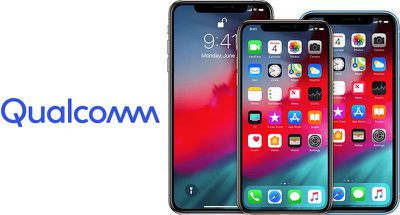Apple CEO Tim Cook: We Feel Good About Resolution With Qualcomm
During today's earnings call covering the second fiscal quarter of 2019 (first calendar quarter), Apple CEO Tim Cook was asked about Apple's settlement with Qualcomm.
While Cook declined to provide color on how this will affect Apple's development plans in the future, he did say that Apple is satisfied with the resolution.

We're glad to put the litigation behind us and all the litigation around the world has been dismissed and settled. We're very happy to have a multi-year supply agreement and we're happy that we have a direct license arrangement with Qualcomm that was important for both companies. We feel good about the resolution.
Apple and Qualcomm reached a settlement in mid-April and agreed to drop all litigation in multiple countries around the world. Apple made a one-time payment to Qualcomm and inked a six-year licensing agreement to use Qualcomm's patented technologies.
The settlement also included a chipset supply agreement, and Qualcomm is expected to provide the 5G chips that Apple will need to introduce 5G connectivity in its 2020 iPhones.
While rumors have suggested Apple is going to add 5G in 2020, Apple itself has not confirmed those plans and Cook did not provide details on Apple's 5G timeline when asked. He did, however, say that Apple aims to get new technologies into products as soon as it can.
We look at a lot of things on the different technologies and try to look at and select the right time that things come together and get those into products as soon as we can.
After Apple and Qualcomm announced their settlement agreement, Intel said that it was dropping out of the smartphone modem chip market entirely, with no plans to manufacture 5G chips.
Popular Stories
Apple's next-generation iPhone 17 Pro and iPhone 17 Pro Max are just over two months away, and there are plenty of rumors about the devices.
Below, we recap key changes rumored for the iPhone 17 Pro models.
Latest Rumors
These rumors surfaced in June and July:Apple logo repositioned: Apple's logo may have a lower position on the back of the iPhone 17 Pro models, compared to previous...
Apple should unveil the iPhone 17 series in September, and there might be one bigger difference between the Pro and Pro Max models this year.
As always, the Pro Max model will be larger than the Pro model:iPhone 17 Pro: 6.3-inch display
iPhone 17 Pro Max: 6.9-inch displayGiven the Pro Max is physically larger than the Pro, it has more internal space, allowing for a larger battery and...
In 2020, Apple added a digital car key feature to its Wallet app, allowing users to lock, unlock, and start a compatible vehicle with an iPhone or Apple Watch. The feature is currently offered by select automakers, including Audi, BMW, Hyundai, Kia, Genesis, Mercedes-Benz, Volvo, and a handful of others, and it is set to expand further.
Apple has a web page with a list of vehicle models that ...
The calendar has turned to July, meaning that 2025 is now more than half over. And while the summer months are often quiet for Apple, the company still has more than a dozen products coming later this year, according to rumors.
Below, we have outlined at least 15 new Apple products that are expected to launch later this year, along with key rumored features for each.
iPhone 17 Series
iPho...
Apple is continuing to refine and update iOS 26, and beta three features smaller changes than we saw in beta 2, plus further tweaks to the Liquid Glass design. Apple is gearing up for the next phase of beta testing, and the company has promised that a public beta is set to come out in July.
Transparency
In some apps like Apple Music, Podcasts, and the App Store, Apple has toned down the...
New renders today provide the best look yet relocated Apple logo and redesigned MagSafe magnet array of the iPhone 17 Pro and iPhone 17 Pro Max.
Image via Majin Bu.
Several of the design changes coming to the iPhone 17 Pro model have been rumored for some time, such as the elongated camera bump that spans the full width of the device, with the LiDAR Scanner and flash moving to the right side.
...
Since the iPhone X in 2017, all of Apple's highest-end iPhone models have featured either stainless steel or titanium frames, but it has now been rumored that this design decision will be coming to an end with the iPhone 17 Pro models later this year.
In a post on Chinese social media platform Weibo today, the account Instant Digital said that the iPhone 17 Pro models will have an aluminum...
Amazon is soon to be back with its annual summertime Prime Day event, lasting for four days from July 8-11, the longest Prime Day yet. As it does every year, Prime Day offers shoppers a huge selection of deals across Amazon's storefront, and there are already many deals you can get on sale ahead of the event.
Note: MacRumors is an affiliate partner with Amazon. When you click a link and make a ...
Apple's position as the dominant force in the global true wireless stereo (TWS) earbud market is expected to continue through 2025, according to Counterpoint Research.
The forecast outlines a 3% year-over-year increase in global TWS unit shipments for 2025, signaling a transition from rapid growth to a more mature phase for the category. While Apple is set to remain the leading brand by...






















